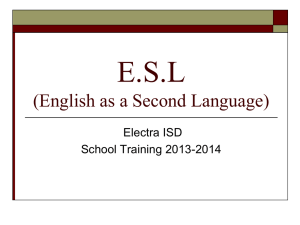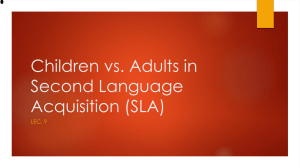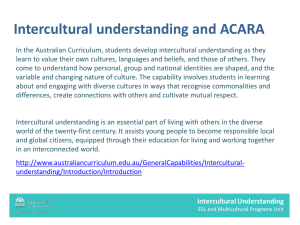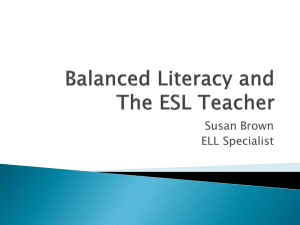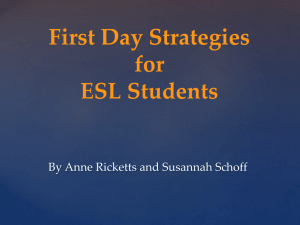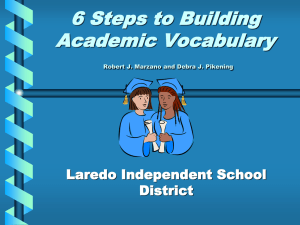Bourassa dossier v11 Nov 2014
advertisement
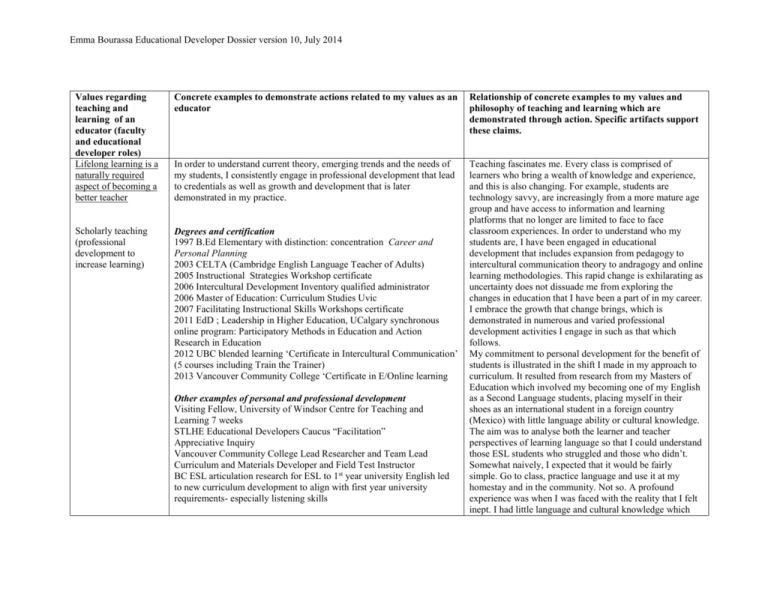
Emma Bourassa Educational Developer Dossier version 10, July 2014 Values regarding teaching and learning of an educator (faculty and educational developer roles) Lifelong learning is a naturally required aspect of becoming a better teacher Concrete examples to demonstrate actions related to my values as an educator Relationship of concrete examples to my values and philosophy of teaching and learning which are demonstrated through action. Specific artifacts support these claims. In order to understand current theory, emerging trends and the needs of my students, I consistently engage in professional development that lead to credentials as well as growth and development that is later demonstrated in my practice. Scholarly teaching (professional development to increase learning) Degrees and certification 1997 B.Ed Elementary with distinction: concentration Career and Personal Planning 2003 CELTA (Cambridge English Language Teacher of Adults) 2005 Instructional Strategies Workshop certificate 2006 Intercultural Development Inventory qualified administrator 2006 Master of Education: Curriculum Studies Uvic 2007 Facilitating Instructional Skills Workshops certificate 2011 EdD ; Leadership in Higher Education, UCalgary synchronous online program: Participatory Methods in Education and Action Research in Education 2012 UBC blended learning ‘Certificate in Intercultural Communication’ (5 courses including Train the Trainer) 2013 Vancouver Community College ‘Certificate in E/Online learning Teaching fascinates me. Every class is comprised of learners who bring a wealth of knowledge and experience, and this is also changing. For example, students are technology savvy, are increasingly from a more mature age group and have access to information and learning platforms that no longer are limited to face to face classroom experiences. In order to understand who my students are, I have been engaged in educational development that includes expansion from pedagogy to intercultural communication theory to andragogy and online learning methodologies. This rapid change is exhilarating as uncertainty does not dissuade me from exploring the changes in education that I have been a part of in my career. I embrace the growth that change brings, which is demonstrated in numerous and varied professional development activities I engage in such as that which follows. My commitment to personal development for the benefit of students is illustrated in the shift I made in my approach to curriculum. It resulted from research from my Masters of Education which involved my becoming one of my English as a Second Language students, placing myself in their shoes as an international student in a foreign country (Mexico) with little language ability or cultural knowledge. The aim was to analyse both the learner and teacher perspectives of learning language so that I could understand those ESL students who struggled and those who didn’t. Somewhat naively, I expected that it would be fairly simple. Go to class, practice language and use it at my homestay and in the community. Not so. A profound experience was when I was faced with the reality that I felt inept. I had little language and cultural knowledge which Other examples of personal and professional development Visiting Fellow, University of Windsor Centre for Teaching and Learning 7 weeks STLHE Educational Developers Caucus “Facilitation” Appreciative Inquiry Vancouver Community College Lead Researcher and Team Lead Curriculum and Materials Developer and Field Test Instructor BC ESL articulation research for ESL to 1st year university English led to new curriculum development to align with first year university requirements- especially listening skills Emma Bourassa Educational Developer Dossier version 10, July 2014 Scholarship of teaching (research of/for learners to revise curriculum, pedagogy for increased learning) French immersion Quebec City to revisit and expand on M.Ed research (see below) Reading publications, attending pro-d sessions (e.g. Teaching Practices Colloquium, POD, STLHE among others) to increase knowledge of pedagogy and apply to course revision for outcomes, activities and assessment (see artifacts in Lifelong Learning file) Web design online course self-directed UCalgary doctoral courses 100% online Instructional Development online certificate (planning an online courselearning outcomes, activities and assessment) Teaching Portfolios University of Windsor E-portfolios University of Washington Video camp TOOC University of Saskatchewan Research In progress: What are faculty perceptions of the impacts on themselves and students from involvement with the professional development program: Interculturalizing Curriculum? M.Ed Curriculum Studies action research: became one of my students by studying a language I had little working ability and living with locals in homestays. Insights into the learner and teacher aspect led to a complete rewrite of curriculum for one course which affected my teaching philosophy and all teaching/facilitating (students and faculty) How using visuals to represent rhetorical styles could increase student understanding, self analysis and synthesis to write in a N.A. university style (action research) Thompson Rivers University Open Learning PLAR (Prior Learning Assessment Recognition) to explore challenges of using a N.A. approach to assessing skills and knowledge in an intercultural context. Undertaken with students in Myanmar (Burma). Results indicate culture is a key factor. was extremely stressful. Although I had travelled to 25 countries, and was an adult, I was rendered incompetent in that context. While in this state of disequilibrium, I still had to be open to unplanned events and outcomes so that I could reflect on them later. Not having control of my learning (pedagogy did not support my learning style) nor daily activities challenged my need to be effective; I wasn’t. This was new. I had also placed myself in Mexico at Christmas time – the most important family time for me. Not only was I unable to communicate, I was now isolated and far from the emotional support I was used. Now I understood what might be happening internally for my students. It was beyond language. It was through this experiential learning that I gained insight that would not have been as rich when I had read about the potential culture shock. The subsequent insight into the power of culture shock led me to revise curriculum and my approach to students.(see newsletter, student feedback in Reflective Practioner file) I included culture shock not only as a topic but an ongoing theme to elicit the student experience. This helped to inform me of students’ real day to day struggles and it also increased students’ trust and willingness to talk to me about what they were going through. That was a powerful shift for me because prior to that I was more concerned with what was on the ‘contract’ of the course outline. I was more focused on the ‘work’. The field test for the VCC Experiential Learning for ESL credential is completed. The strength of the curriculum is that it is flexible for different teaching styles and philosophies. The challenge I faced as we revised and rethought the focus and timing was to consider the assumptions we brought to the first draft. Even the word 'community' had to be explored from the perspective of the students. This work involved wearing the hats of Researcher, Instructor, Materials Developer, Lesson Plan Writer, Learning Outcomes Writer, Participatory Action Researcher, Facilitator, Curriculum Developer. Macro/micro views switching all the time. It was a very Emma Bourassa Educational Developer Dossier version 10, July 2014 rich experience. The field test and co-teaching made me consider all the learning going on for me. The first part of the materials development involved 4 instructors with very different areas of expertise and interest. The generative nature of collaboration (not cooperation) was energizing. We continued to grapple with macro/micro ideas and in the end, I returned to 2 key questions: What are we asking the students to do, and how does the curriculum, outcomes, tasks and assessment support them to be able to do it? With the materials ready to go, we began co-teaching. This brought out another aspect of the learning process for me. Now it involved different teaching philosophies and teaching styles. On top of that the course involved just in time teaching and daily planning based on needs assessment as students worked through this new curriculum model. The richness of being able to be present to watch a different, but very effective, way of teaching is an experience I recommend. It challenged me to step back and listen more than I ever have. It also provided opportunities to use the skills from the EDC Facilitation professional development program – refocusing from a lesson planning or activity focus to the larger questions mentioned earlier. It was an intense 6 months. In the end the students were very positive about the experience and in the words of one student, the course is different from any other because they push you out the door (as opposed to keeping the learning in the classroom).It is both humbling and rewarding to have made such a positive difference for these adult students. Demonstrated gains in practice from embracing and participating in lifelong learning: The shift to become more involved with the social and emotional aspects of learning led to more caring and curiosity about the invisible cultural aspects at play that held some students back from success. Further study of scholars and training in intercultural communication led to Emma Bourassa Educational Developer Dossier version 10, July 2014 other curriculum shifts to experiment with the use of visuals to examine the difference in cultural rhetorical styles of communication that could affect student success. Results showed that students were not incapable; rather, they needed support to understand that different communication styles existed and that to be successful in academics in Canada, they would need to adapt. This learning expanded to action research in my ESL writing classes as well as action research to investigate how a north American framework for PLAR (Prior Learning Assessment and Recognition) might pose challenges in another cultural context. In both cases, preliminary results indicate that knowledge of rhetorical style and my scaffolding approach to teaching it has led to student success. (see artifacts in Reflective Practioner file) In particular, in ESAL 0580, the pre-requisite for first year English, what typically had a withdraw or fail rate of about 30% was reduced to one student not passing. And that student simply needed more time and practice. By being fascinated by teaching and learning and committed to growth, I have increased my effectiveness as a teacher. But I believe my responsibility lies not only in my classes but to the broader education community. As intercultural theory affects interdisciplinary pedagogy, I have made contributions not only in ESL but also as an educational developer both at TRU and beyond. This is described later in the Collaborative Educator portion of this dossier and in publications in my resume. Increasing teaching effectiveness requires one to be a reflective practitioner In addition to participating in personal and professional development, I routinely question what I teach, how I teach, the effects of my teaching and why I would retain or revise any of it. These are illustrated in the following student and faculty sessions: New faculty intercultural session plan ESAL student feedback Faculty development sessions feedback Personal journaling Notes to myself on content/lessons/activities Annual Professional Activity reports which include a narrative of the year Increased knowledge of the student experience and openness to change and growth comes about by reflection. Sometimes it is thrust upon me such as the Mexico Masters research experience; at other times it is consciously considered. It is not enough for me to just think it. I routinely request feedback from students during classes, at various stages of a semester and at the end of a semester. Specific examples in ESAL 0450 which demonstrates a concern for students’ social and emotional well-being and in ESAL 0580 which includes students’ perceptions of the worth of including Bloom’s taxonomy and the visuals for Emma Bourassa Educational Developer Dossier version 10, July 2014 rhetorical style. (see student feedback Learner Focused and Reflective Practitioner files for artifacts ) Reflection has led to a better understanding of and commitment to being a student centered educator and recognition as an excellent teacher. (see student letters in Learner Focused file) Demonstrated shifts from reflection on practice: An understanding of the need to be explicit with cultural expectations led to the development of a course ‘newsletter’ approach to supplement the course outline which was, by and large unread and/or not understood by many ESL students. (see Student feedback in Learner Focused and Reflective Practitioner files). An empathy building exercise was developed out of the rhetorical styles visuals presented with ESL writing and oral communication classes. This exercise is now published for use in intercultural educational and corporate training (see Deardorff in Publications) A passion for teaching and learning means supporting educators and students beyond my discipline Teacher training Practicum supervisor for TESL students certification (post degree program) ISW facilitator (Instructional Strategies Workshop) Initiated Internationalizing Curriculum Teaching Practices Colloquium committee member and presenter: experiential learning, questioning, reflective practice, learning outcomes (see resume) TA program development (see program plan in Collaborative Educator file) Invited guest speaker for Education students, visiting Chinese teachers, Educational Developers’ Caucus (closing plenary), Vancouver Island University Ongoing (since 2006) volunteering as service to the Centre for Teaching and Learning, developing and delivering sessions and programs including: Curriculum Perspectives, Culture in the Classroom, Intercultural Communication, Writing Across Borders, Evaluation, Applying Backward design to Programs and Courses, inaugural Teaching Assistant Program, ISW (instructional strategies workshops), Interculturalizing Curriculum Conference presentations provincially, nationally and internationally spanning ESL, Trades, Humanities, Education, Leadership Teaching and learning fascinate me, and with each new teaching or learning opportunity, I am energized to share. Ten years ago, as a new instructor, I started the first ESL pro-d weekly program. That evolved out of ESL to a broader audience of faculty within (see Collaborative Educator file) and beyond TRU. I have made efforts to get to know faculty across disciplines and have initiated cross disciplinary class sharing (e.g. Arts, Education with ESL) and facilitated those classes. I have dedicated 8+ years of service in the Center for Teaching and Learning. This provided a place to branch out of ESL and facilitate workshops specifically related to pedagogy and teaching. As higher education faces internationalization and indiginization of campuses, I have been very active in learning about these issues and initiating and co-presenting to faculty both at my and other campuses, face to face, in publications and online. Student success is a new area of interest and I have been invited to participate in undergrad and grad workshop Emma Bourassa Educational Developer Dossier version 10, July 2014 Pedagogy, Instructional, course and program development experience International Faculty Development Program University of Windsor Centre for Teaching and Learning ESL Pathways Experiential Learning curriculum development, field test instructor, revision of materials (see resume for roles) Evaluation of Global Competency credential Student success/Leadership workshop development Scope and Sequence for TRU World ‘Tourism’ program Curriculum for Chilean educators “Leadership” Curriculum revision for Advanced Oral Communication, Integrated Skills Level 2 ESL ESL and Drama course creation Intercultural Eyesing Curriculum program development (see ‘Dear Deans’ attachment) Teaching Assistants program development (see program in Collaborative Educator file) B.C. English Language Settler’s Program Coordinator and Volunteer Handbooks (see publications) Queen’s University online pre-departure Study Abroad self-directed study National Film Board of Canada structuring learning activities with films for educational resources Curriculum adaptation for Western Teaching Methods (revised for international elementary teacher context) planning and delivery.To keep current with the use of technology, I have incorporated Moodle into courses and have had students incorporate online resources into assignments. Experiential learning with ISW online and Facilitation of ISW online provided a rich understanding of the need to evaluate tools and choose them for clear pedagogical reasons. What I am finding out so far, is that it is an art to be able to design and implement curriculum for an online or blended course. New areas of consideration such as generations of learners, limitations of electronic programs, and evaluation of MOOCs via PLAR (prior learning assessment recognition) are thought provoking. Most recently I have begun to explore digital story telling. More change! I’m good with that! Outcomes: From Intercultural Eyesing Curriculum program 3 participants have gone on to pursue doctoral studies. Five interdisciplinary faculty participated with domestic and international students in the creation of video vignettes for use in faculty development which is available as OER and has been distributed to 10+ international faculty developers at their request. Published: Open Educational Resource, curriculum and teaching materials for use across Canada in both ESL and general education contexts; results of research on Prior Learning Assessment Recognition (PLAR) ; training materials for Intercultural Developers. Evidence of gains personally and of others from risking to venture beyond ESL: 2014 Faculty Excellence in Internationalization Award See artifacts in Reflective Practitioner, Collaborative Educator, Learner Focused and Dear Deans artifacts files) WHAT IS THE SIGNIFICANCE OF MY WORK? Since 2005 I have expanded from teaching in one department, to engaging faculty in pedagogy and methodology in multiple disciplines including arts, sciences, humanities and trades. I have been called upon to mentor new faculty, be involved with faculty development at the TRU Center for Teaching and Learning, invited to present at conferences and in-services and to work with faculty individually and in small groups to prepare or facilitate a new teaching method such as incorporating experiential learning into the class. My commitment to develop Emma Bourassa Educational Developer Dossier version 10, July 2014 and provide Interculturalizing the Curriculum programs and publishing videos, and activities for Educational Developers and Intercultural Trainers, as well as international research earned me the 2013 Faculty Award for Excellence in Internationalization. The Intercultualizing the Curriculum resulted in 2 participants completing doctoral studies, new course development, SoTL and importantly, the term intercultural is in TRU’s Academic plan and Research plan. I was requested to revise the” Handbook for Teachers of Aboriginal Students” and to edit the “Handbook for Aboriginal Students” My own development as an educator has dramatically shifted; I am more involved with faculty development and student success and have engaged in formal research even though as a bi-partite faculty member, my responsibilities are teaching and service. Current research investigates how faculty perceive a personal and pedagogical change and their perceptions of student learning due to their engagement in the Interculturalizing Curriculum program. Initial findings point to reflective practice and some transformative learning. Other research includes Action Research in my ESL classes and Examing how PLAR (prior learning assessment recognition) in a different cultural context (Myanmar) is understood. Teaching and learning continue to fascinate me as I branch into researching teaching and learning for, of and with other educators. Emma Bourassa Educational Developer Dossier version 10, July 2014

